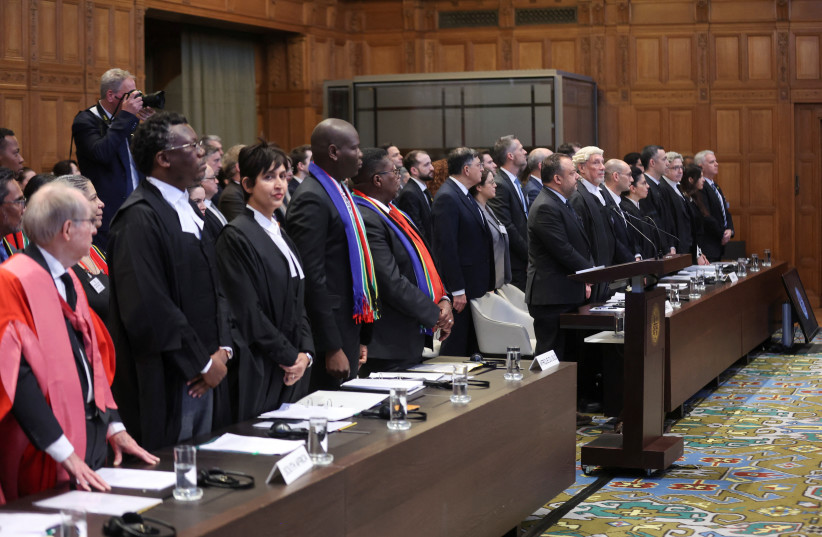Friday’s interim ruling by the International Court of Justice (ICJ) at The Hague on charges of genocide that South Africa brought against Israel is a mixed bag: it has both negative and positive implications for Israel. It could have been better, but it could also have been much worse.
On the one hand, the United Nations’ top court ruled that Israel must “take all measures” to avoid acts of genocide, prevent death and destruction, and improve the humanitarian situation in Gaza.
Alternatively, it declined to order Israel to suspend its military operations in Gaza and did insist that Hamas and other armed groups immediately release the hostages still being held there.
Then again, it did not order Hamas to halt its indiscriminate rocket and terrorist attacks against Israeli civilians, but the ICJ did instruct Israel to submit a report in one month on the progress it is making on the so-called “provisional measures” to avoid killing Palestinians and augment humanitarian aid.
“At least some of the acts and omissions alleged by South Africa to have been committed by Israel in Gaza appear to be capable of falling within the provisions of the [Genocide] Convention,” the judges ruled, according to the court’s President, Joan E. Donoghue of the United States. At least 15 of the 17 judges voted in favor of imposing certain provisional measures on Israel.
“The court is acutely aware of the extent of the human tragedy that is unfolding in the region and is deeply concerned about the continuing loss of life and human suffering,” Donoghue declared.

Only one judge voted against all measures, and it was not Israel's appointment
The ICJ ruling requires Israel to prevent and punish any public incitement to commit genocide against Palestinians in Gaza and to preserve evidence related to any allegations of genocide there, as well as take measures to ease the humanitarian situation for Gazan civilians.
Julia Sebutinde of Uganda was the sole judge to vote against all six measures adopted by the court, while Israel’s ad hoc representative, former Israeli Supreme Court president Aharon Barak, voted against four measures but supported two others.
“I have voted in favor in the hope that the measure will help decrease tensions and discourage damaging rhetoric,” Barak wrote to explain his vote in favor of an order for humanitarian aid and another for the prevention of inflammatory speech. Sebutinde said in her dissenting opinion: “The acts allegedly committed by Israel were not accompanied by a genocidal intent.”
The response in Jerusalem to the ruling was defiant. While acknowledging that “Israel’s commitment to international law is unwavering,” Prime Minister Benjamin Netanyahu vowed to continue the war against “a genocidal terror organization” while facilitating humanitarian assistance and “[doing the] utmost to keep civilians out of harm’s way, even as Hamas uses civilians as human shields.”
He added, “On the eve of the International Holocaust Remembrance Day, I again pledge as prime minister of Israel – Never Again!”
Very different responses, including between Diaspora Jewish organizations
Although the prime minister ordered ministers not to comment on the ruling without approval, National Security Minister Itamar Ben-Gvir posted on X, “Hague shmague,” echoing a contemptuous comment made by Israel’s founding prime minister David Ben-Gurion about the UN, “Um-shmum.”
The Palestinian Authority welcomed the ruling, with Foreign Minister Riyad al-Maliki saying the ICJ “ruled in favor of humanity and international law,” whereby South Africa deemed it “a significant milestone in the search for justice for the Palestinian people.”
Responses from Jewish umbrella organizations ranged from hailing to assailing the ruling. The Jewish Federations of North America (JFNA) called it “deeply flawed,” while noting that it “affirms Israel’s right to continue defending itself.”
The South African Zionist Federation called it “a blow to South Africa’s political gambit to falsely label Israel’s acts of self-defense as genocide,” whereas president of the European Jewish Congress, Ariel Muzikant, stated: “This interim decision frankly rewards terror.”
So what now? The UN Security Council has scheduled a meeting for Wednesday to discuss the ICJ decision. UN Secretary-General Antonio Guterres stressed that the ruling is legally binding and he “trusts” Israel to “take all measures within its power” to prevent genocide against the Palestinian people in Gaza.
Though there is now a legal precedent for international pressure on Israel to comply with the ruling, experts say it is not practically enforceable, and the US is expected to veto any Security Council resolution calling on Israel to stop the war so long as 136 hostages are still being held in Gaza.
